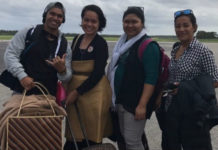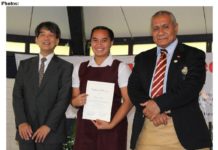Master of Business Studies graduate Seluvaia Malua-Paea interviewed women working in a variety of organisations and in varied leadership roles. “It was mind-blowing to see how these strong women succeed in New Zealand organisations but, at the same time, still carry with them their values acquired during their upbringing, their cultural identities.”
Mrs Malua-Paea found that Tongan women offered strong leadership even in male-dominated organisations using their cultural values to counter some of the challenges they faced. For example, women who were leading teams with older men used traditional attitudes of respect for elders, often treating the men as they would uncles or father figures.
“So rather than trying to dominate or push them around, they used respectful ways to communicate with them and that encouraged the men to give them respect in return and complete the tasks given to them.”
The study found the importance of humility in the Pasifika context also came into play with Tongan women remaining humble despite their job titles or positions. While these traditional virtues may seem out of step with modern thinking, Mrs Malua-Paea found the women in her study were still able to provide strong leadership.
“At times research has proposed that for women to be successful as leaders they need to act as men to show their strength, but this study has found they don’t have to be like men to be great leaders. They can be themselves and use the values of their upbringing or culture as frames to communicate well, to build relationships with their teams and achieve their team’s targets.”
Mrs Malua-Paea says leadership is about igniting the light in others and strength isn’t necessarily about being dominant.
“To be strong for me is to have perseverance, to be humble and to respect others and be respected. To be strong is to know your place in the organisation and to know how to work within that space to influence others. You can be a leader wherever you are and make a difference.”
Mrs Malua-Paea hopes to publish parts of the study to help organisations better understand their staff members and to encourage the best from them.
Mrs Malua-Paea, originally from Nukunuku in Tonga, is a Pasifika Learning Consultant at Massey University working with Pasifika students.
-Massey University






